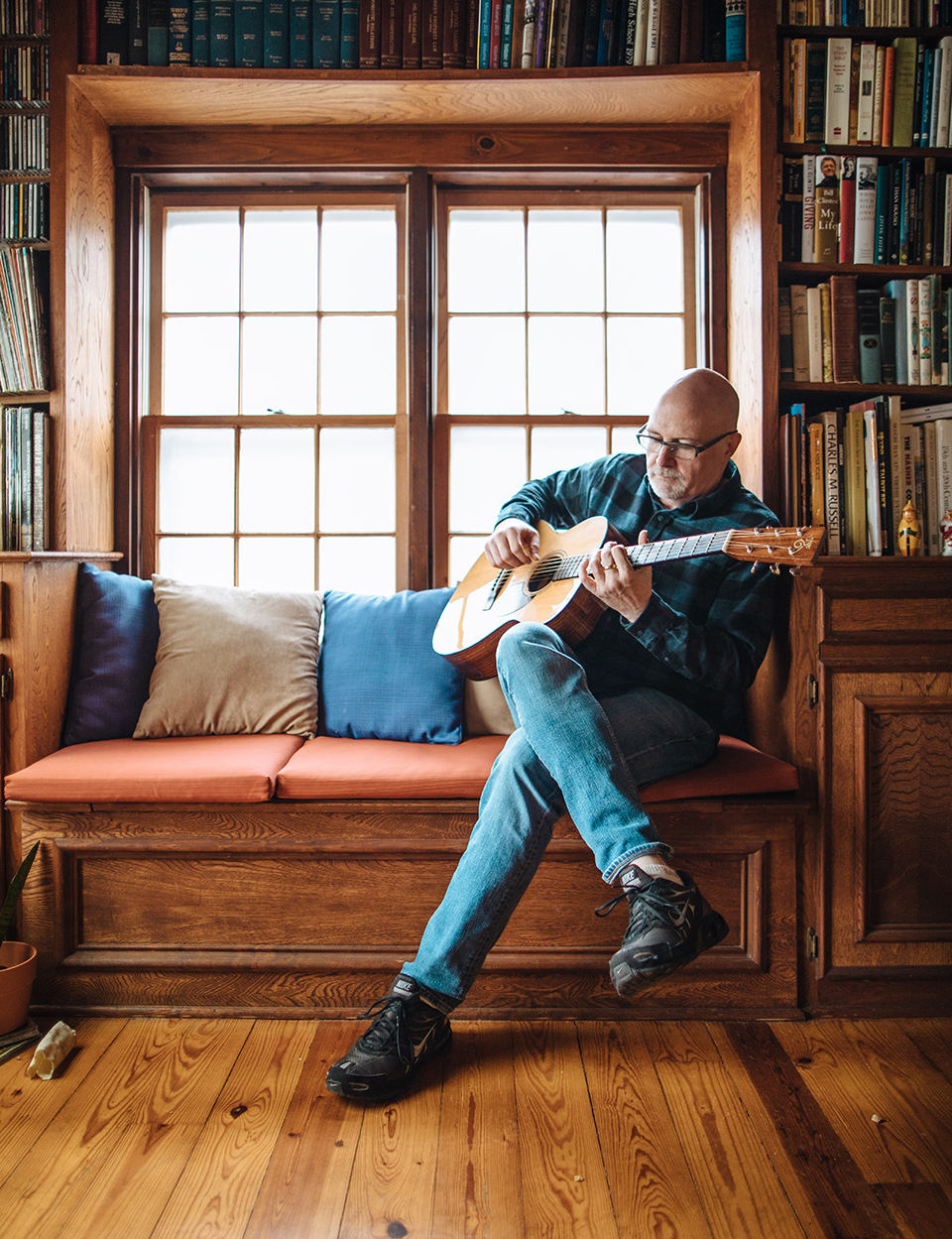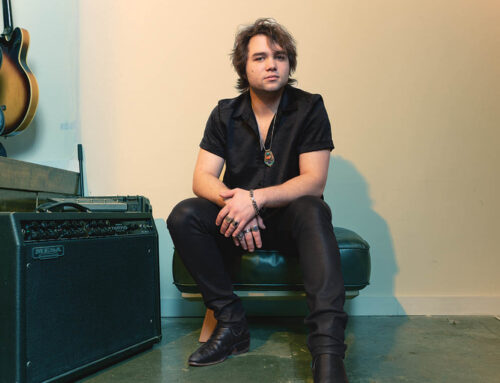By Patti Vinson

Erik Folkerth (Photo by Kathy Tran)
Righteous music
Walk with me down by the lakeside
Just as the sun disappears
We’ll skip a few stones on the smooth side
One for each thrown-away fear.
Eric Folkerth commands the pulpit as the leader of Northaven United Methodist, but he spends his off hours moonlighting as Dallas’ own version of Bob Dylan.
Actually, Folkerth would likely prefer to be compared to his “songwriting saints” such as Dan Fogelberg, James Taylor, Harry Chapin and Carole King. He has no hesitation telling you that music is one of the things that has saved his life.
Folkerth has played guitar since an intro to guitar class in middle school. The songwriting, too, poured out of him, though he admits those early teenage attempts lacked finesse. “They were terrible,” he laughs, remembering songs that brimmed with adolescent angst.
As he matured, so too did his work, and he first performed some of his songs in Austin while a student there in the early 1980s. A few years later, he returned to Dallas and continued to pursue his music. “My first musical haunt was Poor David’s Pub on Lowest Greenville. I would play open mics there.”
Folkerth says some are surprised, given his profession as a minister, that his music isn’t gospel. But he saves religion for the church, regarding Christian music as more about making statements or declarations. What moves Folkerth’s soul, musically speaking, is telling stories, in the tradition of folkies like Paul Simon.
His songwriting skills apparently much improved from his teenage attempts. Folkerth’s song “I Will Sing” earned an honorable mention in the Billboard Song Contest and in the Great American Song Contest. It also was featured in a United Nations project called “New Songs for Peace.” On a personal level, Folkerth describes “I Will Sing” as his “personal anthem.”
In 2005, Folkerth’s song “Prairie Chapel Road” became the “unofficial song of Camp Casey,” an encampment of anti-war protesters near then-president George W. Bush’s ranch in Crawford, Texas. The song would eventually be the soundtrack to a short film and appear in a story on BBC Radio.
Over the years, he shared the stage at Kerrville Folk Festival, mecca for folk music lovers; and elsewhere with folkie luminaries Joan Baez, Tom Prasada-Rao, James McMurtry, David Wilcox, Terry Hendrix, Bill Nash, the list goes on and on. He was also a founding member of Connections, a cover band of Methodist ministers and layfolks whose shows raise money for charity. He was a semi-finalist at South Florida Folk Festival, Fifth Street Festival and Richardson’s Wildflower Festival.
A few years ago, though, Folkerth hit a wall. Life was out of balance. He’d been working long hours building his church: literally, a new building; figuratively, growing the membership. He put on a good bit of weight and put down the guitar. Folkerth says, “It was a dark time in my life.”
He turned to a therapist, who brainstormed with him about digging out of the hole.
“He said science has shown several things that lift our minds and spirits from depression. Medication, yes. But also healthy food, deep relationships, exercise, prayer and meditation.”
It was when Folkerth mentioned his music that the therapist became “extremely animated, and excitedly told me how research has shown how musicians get special hormones and brain chemicals from playing and singing.”
“You must play your music,” the therapist told him. In a very real way, he said, music heals us.
Folkerth went home, picked up his guitar and fell in love with it all over again. He was soon eating better and bought a bike. Folkerth now rides round and round White Rock Lake, usually 20 to 30 miles, several times each week.
“My best time to write — songs, sermons, blogs — is when I’m riding,” he says.
The divisive political world has inspired his work this year, such as his recently penned “Your Full Height,” inspired by the Women’s March, the airport protests and other acts of social justice.
“This is not a ‘protest song,’ so much as a song to inspire and give hope to the protestors,” he explains on his website. “Now is the time for everyone to stand up to their full height.”
Folkerth finds great meaning and purpose in his work as a minister and in his activism. But his music brings him a particular peace, and he spends as much time as he can in his home studio. He’s hard at work on a new CD for release in 2018 and looks forward to more live performances at Uncle Calvin’s Coffee.
“Music and writing songs will always be part of my life,” he says. “It’s healing for me. It can be healing for other people. It’s a great joy.”
Chorus of “I Will Sing”
I will sing for the suffering
I will sing for the beauty
I will sing for creation
I will not sing for duty
I will sing for the future
I will sing for the memory
I will sing for the struggle
I will sing for the glory of it all.






